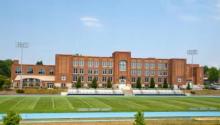Special Education

Special education is defined by law as “specifically designed instruction that meets the unique needs of a child with a disability.” Depending on your child’s disability, the public school system offers a wide range of services and support, including special education, related services, transition services, supplementary aids, testing accommodations, assistive technology and transitional supportive services. The Individuals with Disabilities Act (IDEA) was created in 1975 to entitle children with disabilities to “free and appropriate” education. In the past, many students with disabilities were placed in separate classes focusing on their needs and generally did not integrate with the general student population. However, IDEA was revised in 1997 to ensure that children with special abilities have access to a general curriculum, and new laws in Massachusetts require the districts to place students with disabilities in the least restrictive environment possible.
Trying to navigate the admissions process for a normal child is difficult. The process for obtaining the appropriate services for a child with disabilities is much more involved and time consuming. We can help. Good sources of information regarding your public school options include Federation for Children with Special Needs, Massachusetts Association of Special Education Parent Advisory Councils, the Disability Law Center and Volunteer Lawyers Project.
Public Schools

Students with special needs are guaranteed by federal law to a free and appropriate public education regardless of handicap or disability, and state law requires that such students are placed in the “least restrictive environment". To obtain information about these programs, please click on the following link for the Boston Specialized Services.
In Boston, the specialized services include:
Substantially Separate
The district offers substantially separate programs for all of the major areas of disability. Students are provided with specialized instruction throughout their day within a small group structured setting. Research-based practices, specific to disability, are utilized in the specialized Classroom.
Inclusion
In BPS, we are committed to educating every student in the least restrictive environment. Inclusive education is an opportunity for schools to meet the needs of all students by teaching learners with disabilities alongside their non‐disabled peers. The Boston Public Schools believe that all children can learn together in the same schools and classrooms with appropriate supports. Our mission is to allow each student to develop to their potential with the maximum amount of inclusive opportunities. The world is inclusive, and at BPS, we believe an inclusive education prepares students for success within the broader community.
Related Services
We provide support to students with disabilities to help them succeed and access the curriculum, including Speech-Language Pathology, Occupational Therapy, Physical Therapy, Adapted Physical Education, Teachers of Visually Impaired, Orientation and Mobility, Assistive Technology and a Mainstream Team for the Deaf and Hard of Hearing
Transition
BPS transition services are available for all students ages 14-22. The goal of our transition embedded curriculum is to prepare students for post-secondary success. Our transition curriculum addresses each student’s, preferences, needs, vision, and goals for the future, and may include Vocational Training, Adult Services, Independent Living, or Community Experience
Public Day Schools
BPS provides three public day schools as a continuum of services for students with disabilities. With these placements, the student will receive specialized instruction and related services in a separate school.
- The Horace Mann School for the Deaf & Hard of Hearing provides personalized clinical and academic services for deaf and hard of hearing students in pre-school through high school
- The McKinley Schools provide students with emotional and behavioral disabilities with therapeutic and educational supports. McKinley Elem. Grades K-5 & McKinley Middle Grades 6-12
- The Carter School provides intensive educational services and personalized care for students with multiple severe disabilities. Grades 6-12
If you are having trouble with the public school system, the Disability Law Center (617-723-8455) and the Volunteer Lawyers Project (617-423-0648) offer free and low cost legal services to low-income families.
Please click on the following link to learn more about how to obtain public special education services in Boston.
Private Schools

The private schools in the Greater Boston Area that offer special education services tend to be small and well structured. The classes typically vary from six to twelve students with various specialists who assist children during class. The classes also tend to serve students of mixed ages, since children with disabilities learn at varying rates that do not necessarily correlate with age. Most importantly, all of the good private schools aim to integrate students with disabilities into regular classes as soon as possible. Finally, the private schools can be very costly. However, the track records of the good schools are undisputable, mainstreaming special education students at very early ages and often sending some to elite colleges.









